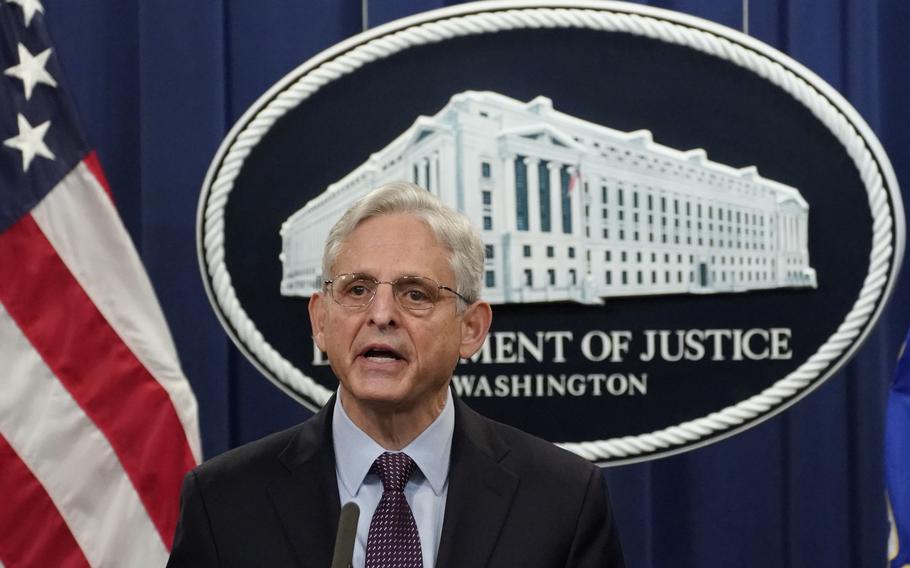
Merrick Garland, U.S. attorney general, speaks during a news conference at the Department of Justice in Washington on Nov. 8, 2021. MUST CREDIT: Bloomberg photo by Ting Shen. (Ting Shen)
Some of the same people who once considered Merrick Garland a martyr to Republican villainy now consider him a disappointment, or worse, as attorney general. What they want him to do, most of all: Indict former President Donald Trump. Garland should keep disappointing them.
University of Michigan law professor Barbara McQuade, a former U.S. attorney, has made the most thorough case for indictments. Trump pressured Vice President Mike Pence to block congressional certification of Joe Biden’s victory in the 2020 presidential race. Trump engaged in this pressure campaign even though many people — including federal judges, state officials and his own advisers — had indicated that he lost the election, the widescale fraud he kept invoking had not occurred, and the Constitution now demanded that Biden take office.
This course of behavior, McQuade argues, broke two laws. It was a corrupt attempt to obstruct or impede an official proceeding, and it was a conspiracy to defraud the U.S.
McQuade acknowledges that “charging Trump criminally could have profoundly negative consequences for our country,” including “violent protests and civil unrest.” But she concludes it would be worse to let him skate. Applauding her analysis, Washington Post columnist Jennifer Rubin said that if Garland does not act on it, he should resign or be fired.
Federal Judge David Carter made much the same argument as McQuade in a March 28 ruling. Ordering Trump legal adviser John Eastman to turn over documents to the House committee on the Jan. 6 riot, Carter found that Eastman and Trump “more likely than not” engaged in obstruction and conspiracy to defraud.
Trump’s behavior was shameful and impeachable. It is a pity that the country did not form a consensus against it strongly enough to sustain a congressional vote to disqualify him from future office. Whether he should be indicted for it is a different question. There are three reasons to refrain.
First, prosecuting the case would mean proving beyond a reasonable doubt that Trump knew he had lost the election and Eastman’s legal theories were bunk. The evidence that McQuade and Carter have produced leaves room for that doubt. Trump regularly speaks as though he believes things that he has ample reason to believe are false. I would not envy the jury trying to rummage through the attic of his mind.
That Trump was entirely sincere in believing his bonkers claims about the election would be his best strategy in court. Everyone who said during his presidency that he should be removed for mental incapacity under the 25th amendment would have to give credence to this defense, if they wished to be consistent.
The next problem is the awkwardness, and possible folly, of applying broadly written statutes in a way that implicates separation-of-powers concerns that were remote from anyone’s contemplation when they were adopted by the framers of the Constitution. This could also be the basis for a legal challenge to a prosecution. The Supreme Court has ruled that the Administrative Procedures Act does not apply to the president even though it includes no explicit exemption for any member of the executive branch.
The statutes that would be used against Trump include no exemption for members of Congress, either. It’s not hard to picture the tables being turned. What if, next year, Republicans control Congress and use its committees to launch investigations of the Biden administration? What if Democrats decide these are political stunts and do what they can to slow down the Republicans? Would they then be impeding or obstructing an official proceeding?
If Trump gets indicted under the theory now being advanced, the odds that Republicans would say so approach 100%. Each party is already too eager to criminalize the other’s politics.
The third drawback to indicting Trump: It would be more dangerously divisive even than McQuade, to her credit, concedes. His supporters should not, of course, get a veto over a well-grounded prosecution. But they would be all the more zealous in his defense because there would be serious arguments against this prosecution. And the strife would worsen as the parties engaged in escalating tit-for-tat prosecutorial excess.
Garland’s caution, then, could be a form of statesmanship rather than cowardice.
Bloomberg Opinion columnist Ramesh Ponnuru is the editor of National Review and a fellow at the American Enterprise Institute. This column does not necessarily reflect the opinion of the editorial board or Bloomberg LP and its owners.